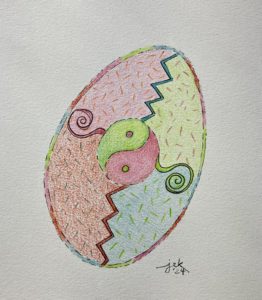
-Artwork © 2024 Jan Ketchel
We are always whole. The question is not whether or not we are whole, but rather, how are we currently living our wholeness? Our lives might currently reflect balance or chaos. Each alternative generates its own configuration of our same inherent ingredients of wholeness. Whether in balance or chaos, we are always whole.
If I long for something that I don’t currently have, the suffering I feel, whether as sadness or anxiety, holds the emotional place for the wholeness I seek. A depression might hold the place for a missing or lost relationship.
The law of compensation is nature’s law of wholeness. Elsewhere known as karma, compensation insists that we fulfill our wholeness by living the natural consequences of our actions. If, for instance, we attempt to keep a trauma at bay through repression or willful suppression, the compensation may express itself in physical symptoms or triggers, which now serve the function of holding space for the unprocessed experience.
Many communication issues in relationships reflect this imperative for wholeness. If one partner presents their interpretation of reality the other partner might automatically see and feel compelled to express the other side of the argument. Wholeness insists upon both sides being represented.
Of course, often couples, or friends who share one’s point of view, will need to project the opposite point of view upon a person or group, outside their personal circle, whom they fervently dislike. In some form, wholeness insists that a one-sided point of view be compensated for by its opposite, which is then lived and owned inwardly, through emotional attachment to one’s projected antagonist.
Hate is a powerful expression of emotional attachment. It’s often very hard to not be obsessed with thinking about someone one hates. Once we can accept that these projections actually reflect aspects of our own wholeness, we can take the first step in shifting the volatile state of balance that our wholeness is in.
Wholeness includes everything. We are riddled with pairs of opposites that comprise our wholeness. Once we outwardly withdraw and take ownership for a hated projection, we can begin the process of reconciling the oppositions that comprise that opposition within our wholeness.
First we must bear the tension of holding this opposition within. Once contained, we can appreciate the value of our formerly hated other. Perhaps, for instance, this hated other reflects our own disdain for the limitations authority figures have imposed upon our lives.
By acknowledging this part of our wholeness, our heavily rational prefrontal cortex can come to appreciate its aggressive limbic counterpart, and those two parts might come to accept their complementary roles and find acceptance and room for each other. This is how we shift the balance in our wholeness.
Accepting and finding room for all that we are allows for a more fulfilling wholeness. When the Rainmaker went into his hut to restore the Tao in the village riddled with drought (see last week’s blogpost), his effort reflected a rebalancing of the oppositions within himself, which then triggered greater balance in the outer world.
Wholeness is the same wholeness, whether it be in drought or rainstorm; the difference is in how we do our wholeness. Finding a compatible relationship between the opposites within ourselves is the key to balance.
The difference in personalities among us is simply that which is emphasized within our wholeness that then results in the state of balance we live with. That which is not emphasized is still part of our wholeness and must still be lived in some form.
If I am a true introvert my wholeness requires that I include extraversion somewhere in my life, even if it is only fulfilled by obsessively hating what I judge to be shallow extraversion in others.
Our journey in infinity, beyond this life, may comprise many lives, where different aspects of wholeness are emphasized. This allows for an ever-deepening knowing of wholeness by exploration of it from many different perspectives. In fact, this is how we truly change the past, which completely shifts the balance of our present and future selves.
Trauma freezes our perspective in the past. Beyond the release of previously frozen emotions in processing trauma is the greater perspective of the present self that frees long-held limiting beliefs and definitions of self. Our wholeness then has the opportunity to come into new balance, which allows for greater exploration and expression of our innate potential in the present.
Ultimately we are all part of the same wholeness. The separateness we experience in this life is all a journey to truly know the self and advance our personal and collective evolution through the achievement of a broader perspective, which can’t help but result in the attainment of refined love, for all.
In wholeness,
Chuck
